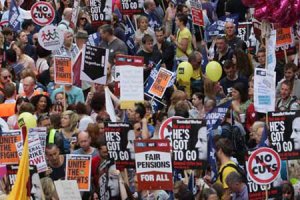During their meeting on 14 September, what had started out as ‘threats’ to strike had clearly evolved to stated ‘plans’ to strike as Union members are trying to pressure the Conservative led government into re-thinking their spending cuts. These cuts will mean that workers would need to pay much higher portions into their pension plans and this is not sitting well with already financially stressed public employees.
According to the TUC leader, Brendan Barber, 30 November would usher in the biggest action taken by unions in at least a generation. Since government is reluctant to openly negotiate, TUC is stepping up actual plans to rally and strike. The purpose behind the strikes would be to call for justice in pensions not only for public workers but for the private sector as well.
Barber refers to this as the biggest mobilisation of trade unions in a generation. It is their intention to issue stoppages the very next day after the autumn financial statement is released. This statement involves the state of the economy in the UK.
Conversely, ministers are claiming that it is no longer affordable to sustain pensions at the current rate as people are living longer. It is government’s intent to raise an extra billion pounds or more in the years 2012 to 2013. They are calling union leaders ‘irresponsible’ if they act on this and as a result, negotiations have come to a complete halt.
Whilst the Labour party is urging both sides to avoid confrontation, neither side is willing to give ground. Even so, Barber does believe that there may yet be hope to avoid a strike as they TUC remains committed to seeking fair settlement through negotiations. With just over two months until the planned strikes, there is time to settle grievances to reach accord.



